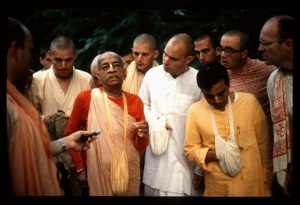SB 7.15.37

A.C. Bhaktivedanta Swami Prabhupada
TEXT 37
- yaiḥ sva-dehaḥ smṛto 'nātmā
- martyo viṭ-kṛmi-bhasmavat
- ta enam ātmasāt kṛtvā
- ślāghayanti hy asattamāḥ
SYNONYMS
yaiḥ — by sannyāsīs who; sva-dehaḥ — own body; smṛtaḥ — consider; anātmā — different from the soul; martyaḥ — subjected to death; viṭ — becoming stool; kṛmi — worms; bhasma-vat — or ashes; te — such persons; enam — this body; ātmasāt kṛtvā — again identifying with the self; ślāghayanti — glorify as very important; hi — indeed; asat-tamāḥ — the greatest rascals.
TRANSLATION
Sannyāsīs who first consider that the body is subject to death, when it will be transformed into stool, worms or ashes, but who again give importance to the body and glorify it as the self, are to be considered the greatest rascals.
PURPORT
A sannyāsī is one who has clearly understood, through advancement in knowledge, that Brahman — he, the person himself — is the soul, not the body. One who has this understanding may take sannyāsa, for he is situated in the "ahaṁ brahmāsmi" position. Brahma-bhūtaḥ prasannātmā na śocati na kāṅkṣati (BG 18.54). Such a person, who no longer laments or hankers to maintain his body and who can accept all living entities as spirit souls, can then enter the devotional service of the Lord. If one does not enter the devotional service of the Lord but artificially considers himself Brahman or Nārāyaṇa, not perfectly understanding that the soul and body are different, one certainly falls down (patanty adhaḥ). Such a person again gives importance to the body. There are many sannyāsīs in India who stress the importance of the body. Some of them give special importance to the body of the poor man, accepting him as daridra-nārāyaṇa, as if Nārāyaṇa had a material body. Many other sannyāsīs stress the importance of the social position of the body as a brāhmaṇa, kṣatriya, vaiśya or śūdra. Such sannyāsīs are considered the greatest rascals (asattamāḥ). They are shameless because they have not yet understood the difference between the body and the soul and instead have accepted the body of a brāhmaṇa to be a brāhmaṇa. Brahmanism (brāhmaṇya) consists of the knowledge of Brahman. But actually the body of a brāhmaṇa is not Brahman. Similarly, the body is neither rich nor poor. If the body of a poor man were daridra-nārāyaṇa, this would mean that the body of a rich man, on the contrary, must be dhanī-nārāyaṇa. Therefore sannyāsīs who do not know the meaning of Nārāyaṇa, those who regard the body as Brahman or as Nārāyaṇa, are described here as asattamāḥ, the most abominable rascals. Following the bodily concept of life, such sannyāsīs make various programs to serve the body. They conduct farcical missions consisting of so-called religious activities meant to mislead all of human society. These sannyāsīs have been described herein as apatrapaḥ and asattamāḥ — shameless and fallen from spiritual life.